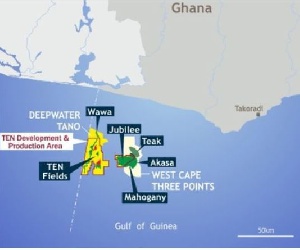 Government has completed mapping of nine additional oil blocks offshore at Western Region
Government has completed mapping of nine additional oil blocks offshore at Western Region
Prospecting for oil offshore Ghana will resume in the coming months as government is set to give out licenses to prospective oil drillers.
Drilling offshore was suspended in the wake of the maritime boundary dispute between Ghana and Cote d’Ivoire, which case was resolved at the International Tribunal on the Law of the Sea (ITLOS) in Germany, last year, has paved way for prospecting and drilling in the area many believe has Ghana’s richest oilfields in the Deepwater Cape Three Points.
Speaking at the just ended annual Offshore Technology Conference (OTC) in Houston, Texas, USA, Energy Minister Boakye Agyarko said plans to open up the space for more investors to explore oil and gas in Ghanaian waters is an issue government is working on as it is determined to increase production in the near future and position Ghana as a major oil producing country.
“At the end of this year, government will undertake the first bidding round for the allocation of new acreages in line with the strategy of pursuing an aggressive exploration drive. This will ensure that we increase the potential for replacing our declining reserves, create opportunities for local and international investors and for improving on the well-being of our people,” the minister intoned at the annual conference.
Allocation and prospecting in the Deepwater fields reputed to be Ghana’s richest was halted following the dispute over its maritime boundary with La Côte d’Ivoire, with that country laying claim to part of it which eventually led to the matter being settled at ITLOS in Germany last year September.
According to industry sources, some of the companies already warming up to begin working in the Deepwater field include American oil majors: ExxonMobil and Hess.
Government, according to the minister, has completed mapping of nine additional oil blocks offshore Western Region for allocation to local and international companies by year’s end. Three of the blocks will be allocated through open competitive tender; two through restricted tender while the remaining four will be handed over to Ghana National Petroleum Corporation (GNPC).
“We are doing this because it is the plan of the government to undertake an aggressive exploration of the country’s oil reserves within its territorial waters,” he said.
He revealed that much work has been done in the field as “the acreage has been mapped out, these are areas where 2D seismic data exists for most parts. That’s one of the reasons we selected the nine blocks because some data exists.”
Sounding very optimistic, Mr. Agyarko revealed that “we know that by the end of the year, we should be doing 200,000 barrels per day. We are hopeful that with BP and Aker coming over, in the next two years of production, they should be able to add another 400,000 barrels per day; Ghana should be doing 600,000 a day to help boost development,” he added.
Oil was discovered in commercial quantities in 2008 at Offshore West Cape Three Points in the Western Region through a Houston-based company – Kosmos Energy – after several failed attempts by the GNPC. Subsequently, several discoveries have been made but only three oilfields are up and running.